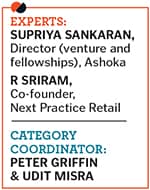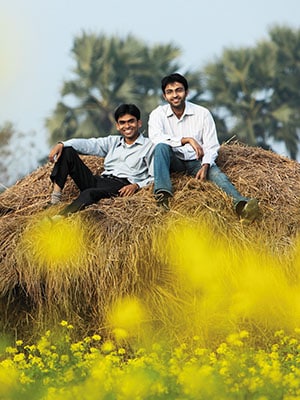
Shashank Kumar: Guiding Farmers At Every Step
Shashank Kumar, 28, tells the story behind setting up FarmsnFarmers to help farmers through every stage, from production to sale of produce
CATEGORY: NGOs & SOCIAL ENTREPRENEURSHIP
The Kumars (who aren’t related) are no strangers to the hard life that an Indian farmer leads: Both come from rural backgrounds in Bihar. They also share an IIT background—Shashank (28) graduating from Delhi and Manish (30*) from Kharagpur—and in fact had first become friends when they were both studying in an IIT preparatory coaching class in Delhi, in 2002.
And they also shared a desire to do something different. Says Shashank, the more voluble of the two, and also an Ashoka Fellow, “I was working as a business associate in an FMCG consulting firm in Gurgaon while Manish was in his last year [at IIT], when we decided to do something in the agriculture sector, although we were not sure what.”
We knew there was a huge disparity between what the customers paid for their food and what the farmers received for producing it, says Shashank, “so it was clear that there was a lucrative opportunity somewhere.”
So in 2009, the two friends started visiting farmers in different neighbouring states, Shashank around Delhi and Manish around West Bengal. Over weekend breaks, they would often get together back home in Bihar and exchange notes about farmers and farming.
Shashank remembers that while the common wisdom paints farmers as rough-hewn experts in their profession who only lack in supposedly modern, urban—and urbane—skills like properly marketing their produce, “the truth is they are clueless about most aspects of farming. That was the biggest take-away from the nine-odd months that we travelled around rural areas.” For example, asked why they had chosen a particular variety of seed or fertiliser, the majority would not have an answer; most simply doing things because that was how they’d done it as far as they could remember, or because they had imitated what a neighbouring farmer had done. And if things went wrong, they had no idea who they could approach. Indeed there wasn’t any real help at hand.
Once aware of the issues at hand, they started FarmsnFarmers in 2010, with the goal of being able to help farmers through every stage of the product cycle, and cutting out middlemen and getting better prices for farm produce.
Supriya Sankaran of Ashoka India says, “Usually in the agri space, people intervene at just one particular point; like they may just help the farmer with input or with marketing or with processes. But with FarmsnFarmers it is a 360° approach. And that is what distinguishes them.”
Extension services aimed at farmers have traditionally focussed on just one aspect. For example, teaching them the benefits of organic farming or of a particular kind of seed. But there has usually been no help with how to actually make such innovations work on the ground. Moreover, the farmers end up bearing all the risk with no guarantee of returns: If a farmer buys expensive seeds and then the crop fails due to unrelated factors, the company selling the seeds would be chuckling on its way to the bank, but there is no recourse for the farmer. Not surprisingly, says Shashank, “Indian farmers are often very stubborn and unwilling to try things out. In our model, we ensure that if farmers are not earning then we also do not earn.”
FarmsnFarmers does this by often bearing the costs of inputs and innovations they suggest, like soil testing. Once the innovations yield profits, they share in the gains. This has helped them build trust, and lay the foundation for more reforms and improvements.
Their model also stands out because they work on a model of micro-enterprises at the local or sub-district level. Like the ‘Dehaat’ centres they run at block level. These centres act as hubs for 600-odd farmers within a five to ten kilometre radius, and are run by a village-level entrepreneur who would otherwise have probably gone to a city for a job. This entrepreneur becomes the local contact with individual farmers and, for his role, earns a decent margin on FarmsnFarmers’s services. The micro-entrepreneur ensures that farmers in his region get their soil tested, queries and problems answered, and builds a databank which is then aggregated by FarmsnFarmers to get the best prices in the final consumer market.
“We first gave them a loan, even without any security because Nabard is a development institution and because both were very passionate about fixing the gap in extension services that exist,” says PK Pandey, AGM, Nabard, Patna region. [The Kumars got their working capital from loans from NABARD, but their model is self-sustaining, with margins good enough for both FarmsnFarmers and the Dehaat operators to make profits.]
Since starting up, FarmsnFarmers has grown to cater to 5,000 farmers in Bihar. They now have 26 full-time staffers, including graduates from prestigious institutions like the Indian Institute of Management. They run 10 Dehaat centres and plan to set up 150 more in the next three years. They have also been approached to start similar centres in other states as well, and are running pilot projects currently in Odisha, Uttar Pradesh and Jharkhand.

*Manish Kumar would have also been on this list, but our cut-off was people who had not yet turned 30 as of January 31, 2014; he turned 30 on January 13, 2014.
Our 30 Under 30 list and methodology
(This story appears in the 30 November, -0001 issue of Forbes India. To visit our Archives, click here.)





